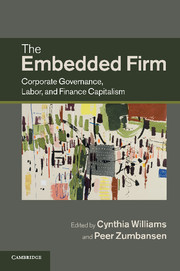Book contents
- Frontmatter
- Contents
- Figures
- Tables
- Contributors
- 1 Introduction: corporate governance after the ‘end of history’
- Part I Historical trajectories of business and regulation
- Part II New interests, new shareholder constellations, new landscapes
- Part III Labor’s evolution in the new economy
- Part IV The transnational embedded firm and the financial crisis
- Part V Conclusion
- Index
- References
1 - Introduction: corporate governance after the ‘end of history’
investigating the new ‘great transformation’
Published online by Cambridge University Press: 07 September 2011
- Frontmatter
- Contents
- Figures
- Tables
- Contributors
- 1 Introduction: corporate governance after the ‘end of history’
- Part I Historical trajectories of business and regulation
- Part II New interests, new shareholder constellations, new landscapes
- Part III Labor’s evolution in the new economy
- Part IV The transnational embedded firm and the financial crisis
- Part V Conclusion
- Index
- References
Summary
Over the last two decades, debates over the convergence or persistence of corporate governance systems have deeply engaged the energies of academics, regulators and investors. These debates have encompassed both the structural mechanisms of corporate decision-making, examining where decision-making authority should lie within the company and which groups should have power, as well as the more politically contested issue of whose interests should matter when corporate decisions are being made. How companies are organized, and what powers their constituents have to influence the corporate enterprise – the core questions of corporate governance – in turn influence capital markets and the investment decisions of managers of huge pools of capital. ‘Does the country have an equity culture’ is often the question asked by investors and asset managers before massive amounts of money are shifted into, or out of, a country at the click of a ‘mouse’.
Debates over the convergence or persistence of corporate governance systems take place in the shadow of at least four significant trends affecting operating companies.
- Type
- Chapter
- Information
- The Embedded FirmCorporate Governance, Labor, and Finance Capitalism, pp. 1 - 12Publisher: Cambridge University PressPrint publication year: 2011
References
- 3
- Cited by



